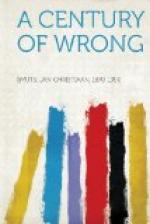The right of the British Government to exercise control over all our foreign relations, and to conduct all our diplomatic negotiations through its own Agent, was thus replaced by the far more slender right of approving or disapproving of our treaties and conventions after they were completed, and then only when it affected the interests of Great Britain or Her Majesty’s possessions in South Africa.
[Sidenote: Status of the Republic.]
It was this Article 4 which gave an appearance of truth (and an appearance only) to Lord Derby’s declaration in the House of Lords that although he had omitted the term of suzerainty, the substance thereof remained. It would have been more correct to have said that owing to the lapse of suzerainty the South African Republic no longer fell under the head of a semi-suzerain State, but that it had become a free, independent, sovereign international State, the sovereignty of which was only limited by the restriction contained in Article 4 of the Convention. Sovereignty need not of necessity be absolute. Belgium is a sovereign international State, although it is bound to observe a condition of permanent neutrality. The South African Republic falls undoubtedly under this category of States, the sovereignty of which is limited in one or other defined direction. But the fact of its sovereignty is nevertheless irrefutable. It will be pointed out later how this position, which is undoubtedly the correct one, has been consistently upheld by the Government of the South African Republic, but it is necessary now to revert to the historical development.
CAPITALISTIC JINGOISM.
FIRST PERIOD.
[Sidenote: The gold fields.]
In 1886 gold was discovered in great quantities and in different parts of the South African Republic, and with that discovery our people entered upon a new phase of their history. The South African Republic was to develope within a few years from a condition of great poverty into a rich and prosperous State, a country calculated in every respect to awaken and inflame the greed of the Capitalistic speculator. Within a few years the South African Republic was ranked among the first gold-producing countries of the world. The bare veldt of hitherto was overspread with large townships inhabited by a speculative and bustling class brought together from all corners of the earth. The Boers, who had hitherto followed pastoral and hunting pursuits, were now called upon to fulfil one of the most difficult tasks in the world, namely, the management of a complicated administration, and the government of a large digging population, which had sprung up suddenly under the most extraordinary circumstances. And how have they acquitted themselves of the task? We quote the following from a brilliant pamphlet by Olive Schreiner, who possesses a deeper insight into the true condition of affairs in South Africa than has been vouchsafed to any other writer on the same subject:—




